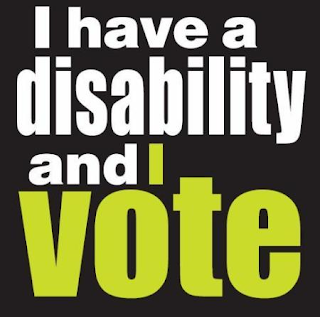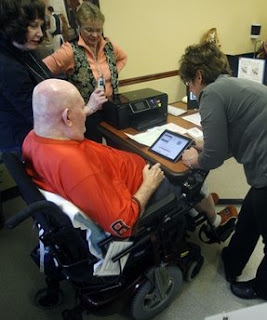 I voted early. I have always voted on Election Day since I cast my first
vote for Ronald Reagan when I was 18 years old.
I voted early. I have always voted on Election Day since I cast my first
vote for Ronald Reagan when I was 18 years old.
That was the 1980 election. I could not stomach another four years of
Jimmy Carter's inept presidency and "malaise."
I wanted to vote early this year for several reasons. I voted for myself
for another term on the Board of the College of Western Idaho. I am unopposed.
Tough race!
My second reason is to support the CWI Bond Election. It will be a tough
race because state law requires a 2/3rd vote. Despite the compelling need, the
reactionary anti-tax voters will be voting against us. I voted early to
change my luck!
 Third? Well. Our horrifying presidential candidates. At the voting
booth, I thought I would get a vision about who is the best of the worst
candidates in our history. No vision came to me. I voted begrudgingly and held
my nose.
Third? Well. Our horrifying presidential candidates. At the voting
booth, I thought I would get a vision about who is the best of the worst
candidates in our history. No vision came to me. I voted begrudgingly and held
my nose.
The early voting at my county was crowded. The handy cardboard temporary
voting booths did the job. I did my civic duty. Ada County Elections
staff are so knowledgeable. Though crowded, the process was a breeze
because of the staff.
However, four years
You see, I have aphasia. The difficulties of people
with aphasia can range from occasional trouble finding words to losing the
ability to speak, read, or write; INTELLIGENCE,
HOWEVER, IS UNAFFECTED.
My aphasia is pretty mild, and
reading a ballot is easy for me. NOW.
 I was listening to an NPR
broadcast today dealing with people who have disabilities. My aphasia is an
invisible disability. How can people with aphasia read a ballot? They
completely understand the issues and candidates. If they fill out a ballot
using the standard 2# pencil with oval shapes, who can help them?
I was listening to an NPR
broadcast today dealing with people who have disabilities. My aphasia is an
invisible disability. How can people with aphasia read a ballot? They
completely understand the issues and candidates. If they fill out a ballot
using the standard 2# pencil with oval shapes, who can help them?
The NPR commentator was
focused on disenfranchised disabled people. It is often difficult for disabled
people to get to a polling place. Think about it. The convenient cardboard
temporary voting booths are not “convenient” when you need a wheelchair or a walker. Long lines are
especially hard when you are disabled.
Not to mention transportation
to get to a polling place. Are there accommodations like vans or busses? In
rural areas, it is even tougher to exercise right to vote.
Even if you have the
opportunity to get to an accessible place, what if you cannot read the ballot
because of aphasia?
This morning when I was
listening to the NPR report about voting and disenfranchised disabled people,
was going to an Aphasia Support Group. We talked about voting, aphasia, and disenfranchised
people.
Absentee ballots are
wonderful. There is no pressure to hurry. They can read the ballot slowly. They
can use a device which “Reads” the ballot aloud. There are more options than
before.
Ada County does many things.
According to Chief Deputy Clerk Phil McGrane, "We do a number of different
things for disabled voters. As you would imagine it depends on the disability.
The most significant of which is our Touch Writer. It is a device made
available to voters who would not otherwise be able to mark a ballot independently.
It's a machine that will assist voters in making their marks by using a
controller, touchscreen, puff and sip, or other accessible attachment. So for
instance a blind voter can use the machine to have the ballot read to them and
then using the controller they can make their selections and a marked ballot is
printed out for them at the end. Each voters experience and need is a little
different, but we try to accommodate everyone as best we can."
I took my responsibility to vote for granted. Until I could not.

Comments